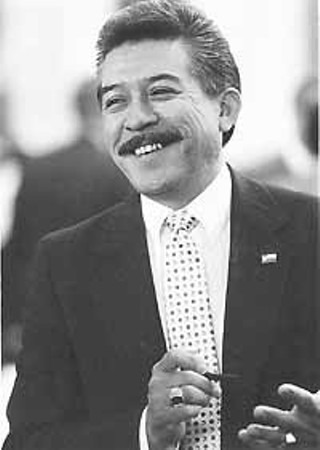Naked City
Peer Pressure
By Mike Clark-Madison, Fri., Dec. 24, 1999

"I thought these meetings were supposed to be boring!" noted one first-time attendee at the Capital Area Metropolitan Planning Organization's Dec. 13 meeting. Them's the old days, buddy, when the CAMPO board -- the regional collective of political all-stars that oversees transportation investments in Metro Austin -- busied itself with a bridge here and a lane widening there. Today, transportation is smack in the center of Austin's political radar, and CAMPO will be the battleground for many skirmishes in our new civic wars.
This time 'round, the fighting words were "peer review," innocuous as that sounds. This proposal, advanced by a group of local heavy hitters including Austin American-Statesman publisher Mike Laosa, outgoing Chamber of Commerce chair Gary Valdez, and Texas Turnpike Authority chair Pete Winstead, called for CAMPO to spend tax money to hire an independent consultant to ... do something.
Even after four months of haggling over this idea, when finally came the hour of decision, the purpose of peer review was, if anything, more opaque than ever. The fact that those pushing hardest for peer review are also those pushing hardest for SH130 has hardly escaped notice. But was the purpose here simply to check the "reasonableness" (i.e., favorability to big highway projects) of the statistical data and planning assumptions used by CAMPO -- and, more to the point, Capital Metro -- in planning their road and rail investments? Or was it to suggest changes to the structure of CAMPO itself and its relationship with the cities and counties within its planning area (i.e., giving the 'burbs veto power)? Or was it to rank various projects (i.e., light rail vs. SH 130) to see which were more "appropriate" uses of our tax dollars, and then review the best way to fund those projects (i.e., raiding Capital Metro's sales tax)?
Well, at the CAMPO meeting, depending on who was talking, peer review was intended to do all of those things, for good or ill. As nice as it would have been for Laosa et al. to simply say, "We think CAMPO's numbers put SH 130 at a disadvantage, and we think that's a bad thing, so let's fix it" -- a perfectly legitimate topic for policy-makers to debate -- such forthrightness was not to be. And by the time state Sen. Gonzalo Barrientos, the CAMPO board chair, brusquely (of course) called the question, the studious efforts by peer review backers to avoid anything resembling honest advocacy left clouds of suspicion stinking up the whole room.
As it turned out, Barrientos already had his mind made up, and in a display of power and pique that astonished even veteran observers of the senator's imperious ways, he tried mightily to ram the idea down the closed throats of the bulk of the CAMPO board. He was foiled by an ad hoc tag team of Austin City Council members. The opening shot came from Daryl Slusher -- not a regular CAMPO board jockey, but filling in for his Cap Met board colleague John Treviño -- who pointed out that Cap Met had not, despite the wishes and claims of peer review proponents, agreed to put up any of the estimated $250,000 price tag for the project. (The peer review squad originally wanted Cap Met to foot the entire bill.) This made the senator unhappy.
Then, after Barrientos caught the motion-to-adopt that he was fishing for, Council Member Bill Spelman took aim to amend it, stripping out everything but the basic, uncontroversial (though still not very well justified) review of the CAMPO numbers. This involved making at least 17 on-the-spot revisions to the peer review proposal, which, after being goaded by Barrientos, Spelman duly offered at high speed, to applause from the audience. (Only in Austin can you get an ovation for making an amendment.) The senator was now very cross.
He got even pissier when Mayor Kirk Watson proposed instead to punt peer review back to the drawing board with a CAMPO subcommittee -- a motion that Spelman gladly acceded to. (Council Member Gus Garcia seconded both Watson's and Spelman's motions.) Despite Barrientos' attempts to squelch the effort -- which included shouting "You are out of order!" like, well, a pompous windbag senator in a bad movie -- Watson's motion passed on a vote of 11 to 8. It was the first time in recent memory that a CAMPO decision required a roll-call vote.
The ulterior motive of peer review was, if anything, confirmed by the breakdown of that 11-8 split: The majority included every member from Austin and Travis County -- save Barrientos but including Republican County Commissioner Todd Baxter -- while the losing slate included the members from points north and south. Even if the absent members -- Sen. Jeff Wentworth and Reps. Terry Keel and Sherri Greenberg -- had been present, the narrow split between city and county would have still tilted toward the urban core.
This dialectic will be of even greater importance as CAMPO faces much bigger issues early in 2000 -- SH 130 and other toll roads, and then the revised overall transportation plan. The latter is set for adoption in June of 2000, just in time for Austin to be declared an air-quality non-attainment area, which will set the stage for more CAMPO conflict for years to come. The next engagement comes Feb. 7, when CAMPO holds what will probably be its last and biggest public hearing on SH 130.
Got something to say on the subject? Send a letter to the editor.








